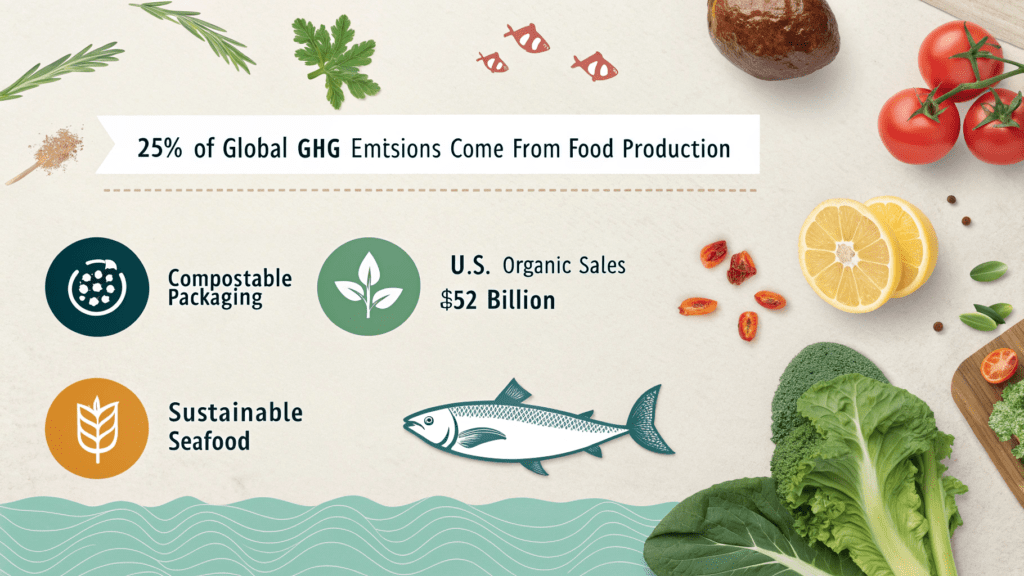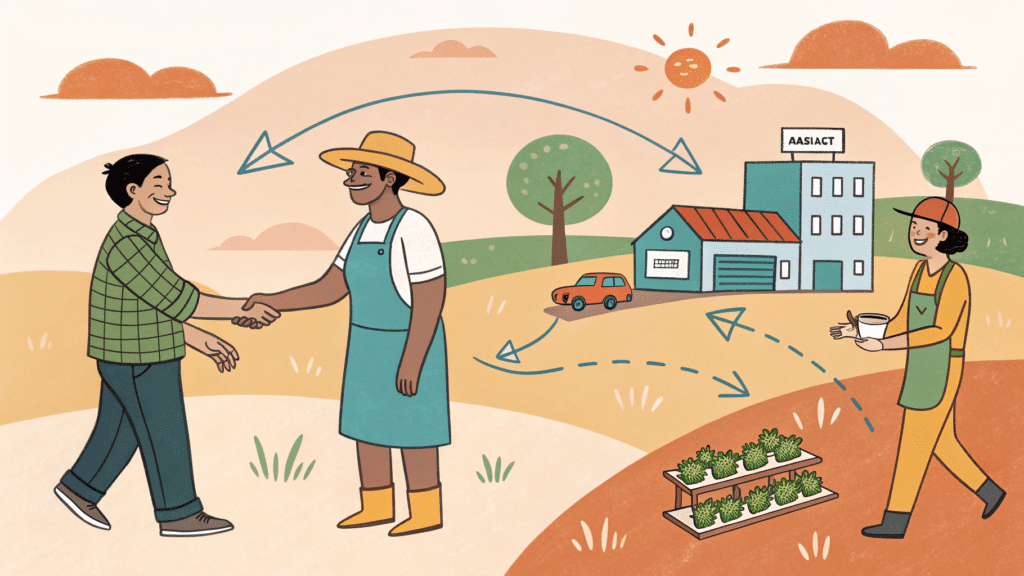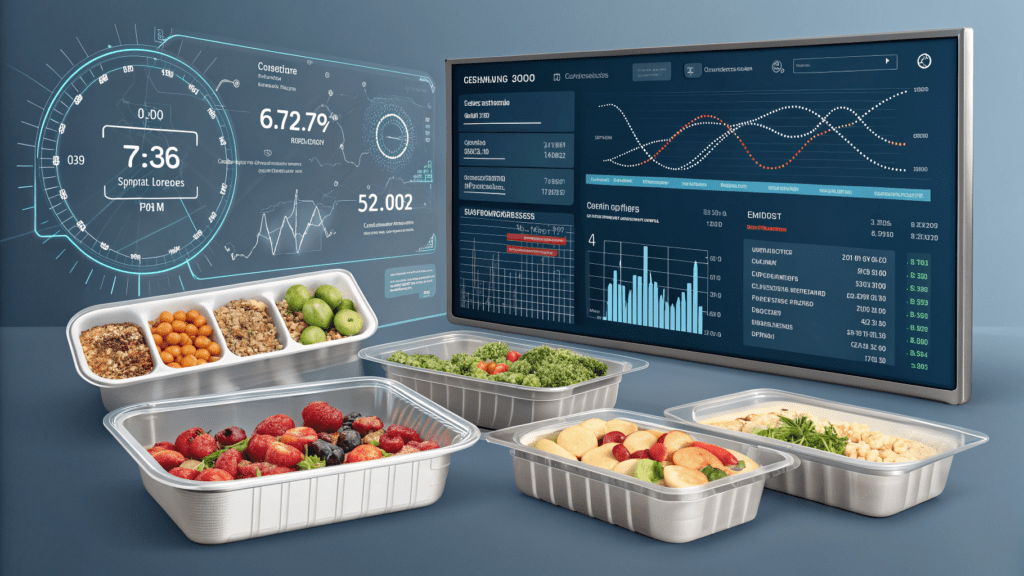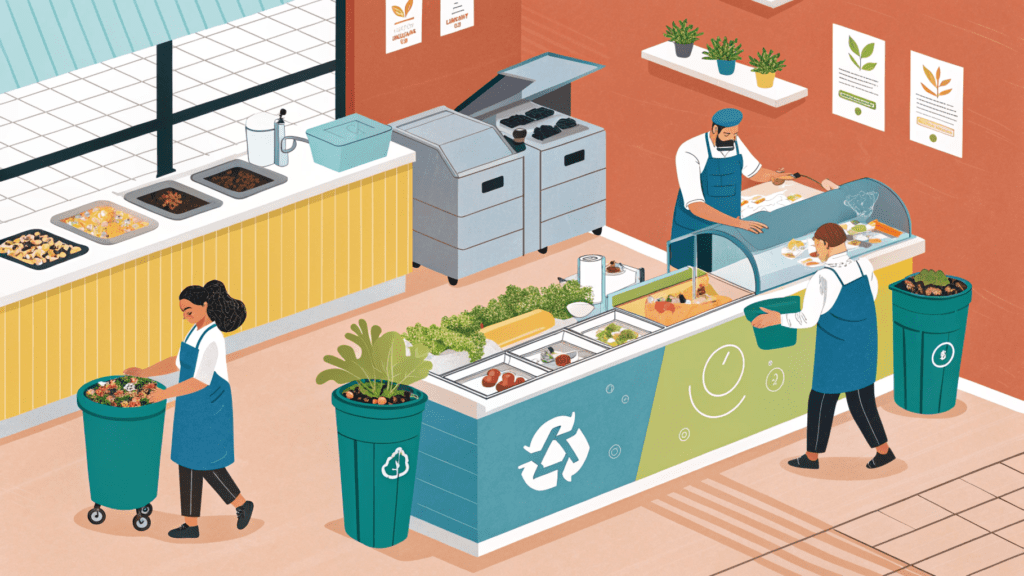The global foodservice industry stands at a critical juncture, facing unprecedented pressure to embrace sustainability. With U.S. organic sales reaching an estimated $52.0 billion in 2021, accounting for 5.5% of all retail food sales, consumer demand for environmentally responsible options is not just a trend—it’s a strategic imperative. This shift is amplified by the stark reality that food production alone contributes approximately 25% of global greenhouse gas (GHG) emissions, compelling both consumers and institutions to demand greener practices.
For procurement managers, operations directors, sustainability officers, and supply chain executives, ignoring this seismic shift carries significant operational and commercial risks. Non-compliance with evolving environmental regulations, increasing consumer scrutiny, and the tangible impact of climate change on supply chains pose direct threats to profitability and market relevance. Conversely, wholesalers are uniquely positioned to be the linchpins in this transition, bridging eco-conscious producers with a rapidly expanding foodservice client base. By proactively embedding sustainability into their core operations, wholesalers can not only meet ethical buyer expectations but also unlock a crucial competitive advantage, enhancing brand reputation and attracting new, high-value clients in a crowded market.

Strategic Sourcing: Cultivating a Greener Product Portfolio for the Eco-Friendly Foodservice Market
Tapping into the eco-friendly foodservice market begins with a robust and transparent sourcing strategy. This involves a meticulous selection of products that meet rigorous environmental and ethical standards, directly addressing the growing demand for sustainable and traceable food.
Prioritizing Certified & Local Products for Market Credibility
Building trust and validating eco-friendly claims requires a commitment to certified products. Partnering with producers adhering to recognized third-party certifications like USDA Organic, the Marine Stewardship Council (MSC) for sustainable seafood, or Fair Trade for ethically sourced goods provides verifiable proof of environmental and social responsibility. These certifications are not merely labels; they are assurances that products meet stringent standards from farm to fork, allowing your foodservice clients to confidently market their sustainable offerings to their own customers.
Beyond certifications, emphasizing local sourcing is a powerful differentiator. Distributors like The Common Market, a non-profit organization, successfully connect over 300 sustainable family farms with institutions such as schools, hospitals, and universities. This model not only reduces the carbon footprint associated with long-distance transportation but also supports local economies and ensures fresher ingredients. As consumers in 2025 increasingly prefer to understand the origin and sustainability of their food, ensuring supply chain transparency and traceability becomes paramount. This allows you to build trust with foodservice clients by providing detailed information about product origins, farming practices, and environmental impact data.
Diversifying Sustainable Product Categories for Broader Appeal
A comprehensive eco-friendly portfolio extends beyond just organic produce. Wholesalers must offer a diverse selection of products that address various sustainability facets, from plant-based alternatives to innovative packaging.
Curate a broad assortment of quality fresh, natural, organic, and specialty products to align with ethical buyer expectations. This includes expanding into functional foods, plant-based, and alternative protein sources, reflecting the significant growth in “flexitarian” diets and consumer interest in health and sustainability. For instance, the interest in plant-based and alternative proteins is expected to continue in 2025, presenting a substantial market opportunity.
Furthermore, a critical area of diversification is sustainable foodservice packaging. Offer a comprehensive selection of compostable, recycled, and reusable items, including popular brands like GreenStripe® products made from renewable plant materials and BlueStripe™ products from post-consumer recycled content, both offered by Eco-Products. Innovate with sustainable packaging solutions, such as those made from Ingeo biobased materials, which reduce reliance on traditional plastics and align with growing consumer demand for environmentally friendly packaging. Providing alternatives like ekologická brčka pro restaurace can significantly help your clients meet their own sustainability goals and comply with evolving single-use plastic regulations.

Operationalizing Sustainability: Transforming Wholesaler Logistics with Green Logistics
Strategic sourcing must be complemented by sustainable operational practices. Green logistics, which focuses on minimizing the environmental impact of supply chain activities, is no longer a niche concept but a core component of competitive wholesale distribution.
Optimizing Energy & Fleet Efficiency for Reduced Carbon Footprint
The operational footprint of a wholesale business—from warehousing to delivery—offers substantial opportunities for carbon reduction and cost savings.
Investing in energy-efficient warehousing is a foundational step. Implement solutions such as LED lighting, smart HVAC systems, electric roller shutter doors with sensors, plastic curtains, and evaporative coolers. These technologies significantly minimize energy consumption for cooling and lighting, reducing overall CO2 emissions. For example, installing solar panels to power warehouses can drastically reduce reliance on fossil fuels, aligning with global sustainability goals like those set by major corporations.
Transitioning delivery fleets is another high-impact area. Moving towards electric vehicles (EVs) or biodiesel vans can significantly reduce tailpipe emissions and greenhouse gas output. For refrigerated transport, consider utilizing motorless refrigeration units on trucks and painting refrigerated vehicles white to reflect sunlight, thereby reducing cooling energy requirements. Route optimization software, leveraging AI and IoT, can further reduce fuel consumption and vehicle miles, leading to 10-20% fuel cost savings and lower maintenance. This efficient transportation and temperature control is critical for high-volume, short-shelf-life food products, reducing both environmental impact and operational costs.

Minimizing Waste Across the Supply Chain Through Sustainable Distribution
Food waste is a pressing global issue, with approximately 30-50% of produced food being wasted across the supply chain. Wholesalers have a pivotal role in mitigating this.
Adopt efficient inventory management and advanced demand forecasting using technology. Accurate data analytics can significantly reduce excess inventory and minimize food waste, helping clients prevent overstocking and spoilage. Beyond prevention, implementing composting and surplus food donation programs diverts edible food from landfills. Resources like the EPA’s Reducing Wasted Food & Packaging Toolkit provide invaluable guidance for commercial and institutional food services on tracking and reducing waste through improved stocking, handling practices, and staff training.
Prioritize recyclable, compostable, and biodegradable packaging solutions for all distributed products. This decreases reliance on landfill-bound plastic and aligns with evolving single-use plastic bans and waste diversion goals. Furthermore, utilize technology for continuous monitoring of storage conditions at wholesale stages to reduce food loss and waste, especially crucial for sensitive, short-shelf-life products.
| Funkce | B2B Operační dopad | Poznámka dodržování předpisů | Potenciál návratnosti investic |
|---|---|---|---|
| Route Optimization | Reduced fuel consumption, fewer vehicle miles. | Aligns with emissions reduction targets (e.g., EU Green Deal). | 10-20% fuel cost savings, lower maintenance. |
| Electric Fleet Transition | Reduced tailpipe emissions, quieter operations. | Future-proofs against tightening emission regulations. | Long-term fuel savings, potential tax incentives. |
| Smart Warehouse Management | Minimized energy use for cooling/lighting, optimized space. | Supports ISO 14001 certification for environmental management. | 15-25% energy cost reduction, improved stock rotation. |
| Compostable Packaging Adoption | Reduced landfill waste, enhanced client appeal. | Meets evolving single-use plastic bans and waste diversion goals. | Reduced waste disposal costs, increased market share. |
Building Bridges: Collaborative Partnerships in the Eco-Friendly Foodservice Market
No single entity can transform the foodservice industry alone. Wholesalers thrive by fostering robust collaborative partnerships across the entire value chain, from farm to fork.
Connecting Farms to Fork: Fostering Regional Food Systems
True sustainability in foodservice distribution requires building strong, resilient regional food systems. Mini Case Study: A prime example of this is The Common Market, a non-profit regional wholesale food distributor. They have successfully established direct connections between over 300 sustainable family farms and large institutional markets like schools, hospitals, and universities. By aggregating products from multiple local farms, The Common Market ensures the volume and consistency needed to supply larger clients, overcoming a common barrier for individual small farms. This model keeps food dollars within communities, fostering new business opportunities and strengthening local economies. Similarly, Paragon Foods demonstrates effective collaboration by connecting local farmers directly to restaurant chains like Eat’n Park, ensuring a consistent supply of sustainable produce.
These partnerships provide an essential blueprint for wholesalers: actively seeking out and nurturing relationships with local, sustainable producers. This not only reduces transportation emissions but also provides fresh, high-quality ingredients that appeal to a discerning, eco-conscious market.

Leveraging Industry Standards & Initiatives for Collaborative Impact
Beyond individual partnerships, engaging with broader industry initiatives and standards solidifies a wholesaler’s commitment to sustainability and demonstrates leadership.
Actively engage with industry-wide initiatives such as the Courtauld Commitment 2030 in the UK, which aims to reduce food waste, water usage, and greenhouse gas emissions across the food and drink supply chain. Participating in or aligning with frameworks like the Food Waste Reduction Roadmap demonstrates a commitment to collective action and industry-wide improvement.
Promote and prioritize products that carry recognized certifications, such as BPI certified compostable products. These certifications, often backed by industry associations or standards bodies, assure clients of a product’s environmental integrity and enhance your credibility and market position. Collaborate with all your suppliers to deliver on shared commitments to sustainability across the entire supply chain. This holistic approach ensures that environmental stewardship is embedded throughout the product lifecycle, from cultivation to delivery. Supporting farmers in economically and environmentally sustainable production through strong, equitable relationships ensures a consistent supply of high-quality, green products.
Empowering Clients: Education, Transparency, & Technology for Sustainable Distribution
Your role as a wholesaler in the eco-friendly foodservice market extends beyond just supplying products; it involves empowering your clients to embrace and leverage sustainability themselves.
Educating Foodservice Partners on Green Benefits
Many foodservice operators are keen to go green but may lack the knowledge or resources. Position your company as a valuable partner by providing detailed information on product origins, certifications, and environmental impact data for eco-friendly items. This transparency builds trust and enables your clients to confidently communicate their sustainable choices to their own customers.
Offer training and resources to clients on integrating sustainable ingredients into their menus and effectively marketing these green choices. Demonstrate the long-term cost savings associated with eco-friendly practices, such as reduced waste disposal fees and enhanced customer loyalty stemming from a strong environmental image. For instance, explaining the lifecycle and benefits of doba rozkladu kompostovatelné slámy can educate clients on tangible environmental impacts. Help them understand how a commitment to sustainable practices can meet their corporate environmental goals and resonate with their increasingly eco-conscious diners.
Harnessing Digital Innovation for Supply Chain Transparency & Green Logistics
The future of sustainable foodservice distribution is inextricably linked to technological advancement. Leveraging digital tools offers unparalleled opportunities for efficiency and transparency.
Harness AI and IoT for accurate demand forecasting, improved stock control, and real-time emissions tracking. Academic research in green logistics highlights how these technologies provide deeper insights into the supply chain, helping identify inefficiencies and optimize energy use. Utilizing integrated digital platforms not only allows you to reach a larger customer base but also significantly enhances traceability from farm to fork.
Smart food supply chain platforms can centralize dispersed data, optimizing logistics and ensuring a stable and sustainable food supply. This translates into improved supply chain efficiency, reducing the time between production and delivery for fresher ingredients and less waste. By embracing these innovations, you can offer clients not just products, but a pathway to a more transparent, efficient, and environmentally responsible operation.
The ROI of Green: Tangible Benefits for Wholesalers in the Eco-Friendly Foodservice Market
Embracing the eco-friendly foodservice market is not just an ethical choice; it’s a shrewd business strategy with quantifiable returns on investment. Wholesalers who lead with sustainability gain a distinct competitive edge that translates into significant financial and reputational gains.
Cost Savings & Competitive Advantage: Achieve significant cost reductions through relentless pursuit of energy efficiency, waste minimization, and optimized transportation. Reduced utility bills from energy-efficient warehouses, lower waste disposal fees, and optimized fuel consumption from smart logistics directly impact your bottom line. This operational efficiency provides a tangible competitive edge, allowing you to offer competitive pricing while maintaining healthy margins.
Enhanced Brand Reputation: In an era where consumers are increasingly factoring environmental impact into their purchasing decisions, demonstrating a verifiable commitment to environmental stewardship is a powerful brand builder. This attracts new, ethically aligned clients and significantly enhances customer loyalty among existing ones. A strong reputation as a sustainable wholesaler differentiates you in a crowded market and builds goodwill.
Increased Resilience: Building a sustainable supply chain inherently improves business resilience. By diversifying sourcing, optimizing resource use, and reducing waste, you become less vulnerable to supply chain disruptions, resource scarcity, and price volatility. Proactively addressing environmental factors prepares your business for future market shifts and enhances long-term stability.
Compliance with Regulations: The regulatory landscape surrounding environmental practices is continually evolving, particularly in the US and EU. By proactively meeting evolving environmental regulations and policies—such as single-use plastic bans or emissions reduction targets—you avoid potential penalties, fines, and reputational damage. Adopting sustainable practices positions you as a forward-thinking leader, fostering a positive public image and ensuring long-term market access.
Závěr
The eco-friendly foodservice market is not merely a trend but a transformative force reshaping the industry’s future. Wholesalers who strategically embrace sustainable sourcing, green logistics, collaborative partnerships, and digital innovation are positioned for significant growth and long-term success. By leading with purpose, you can unlock new revenue streams, strengthen your brand, and contribute to a more sustainable future.
Act now: Partner with eco-conscious suppliers and optimize your operations to capture your share of the rapidly expanding eco-friendly foodservice market. The time to build a resilient, responsible, and profitable wholesale enterprise is today.






